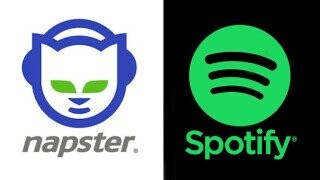5 Early Controversies That Foreshadowed Today's Terrible Internet

The modern tech world is moving at a crazy fast speed. We’ve gone from brick phones so bulky they could survive a nuclear holocaust to basically supercomputers we can fit in our pockets, all within the span of two decades. Despite this, there are pretty substantial problems tech still has to deal with. And while these problems may look recent, you’d be surprised to learn that a lot of modern tech problems have been around for basically forever, like …
Even Ebay Had To Grapple With Hosting Nazi Content
Love it or hate it, eBay has undoubtedly revolutionized online shopping. Not only can you order vintage porno magazines from the '30s, all within the comfort of your home, but you can do it anonymously. The wonders of technology come with their own perils, however.
Don't Miss
Much like how modern websites like Facebook and Twitter deal with fascists on their platforms all of the time nowadays, eBay had its own run-in with Nazi stuff back in its heyday. Well, the issue there wasn't so much Nazis coordinating or preaching Nazi ideology—an auction house really isn't the best forum for political organizing. With eBay, the issue was a whole lot of people selling Nazi memorabilia.

"Dude, it's memorabilia."
See, back in the late '90s, eBay had basically no regulations in terms of what people could buy and sell. Today, they have a long list of prohibited items, everything from secondhand underwear to freshly squeezed orange juice, but it used to be anything goes. That meant people sold Nazi flags, Nazi medals, secondhand Nazi underwear, freshly squeezed Nazi juice, etc.
The only time eBay restricted sales of Nazi goodies was if the buyer was in a country that banned the merchandise, such as Germany. That's where the real parallels to today come: Places like Facebook would later defer to country-specific laws when regulating both Nazi symbols and Holocaust denial.

EBay suffered through headaches and PR upsets over the Nazi stuff, so in 2001, they banned Nazi sales across the website entirely. Sorry, Hitler fans. Now you gotta get your Third Reich fix from that guy in the alley selling helmets out of his van.
Myspace Got Sued For Mass Censorship Back In 2006
We hear lots of calls for social media sites to crack down harder on those Nazis, but the sites actually censor political content all the time ... for stupid reasons. Some people describe this as a crusade against conservatives, but no, you also get websites like Twitter suspiciously removing left-wing accounts for no ‘apparent’ reason and Facebook too removing the accounts of political activists without warning or cause. It makes you wish for the good old days, when people could post whatever they liked (and mostly chose to post blinking text).

Myspace
And yet those days weren’t as free as we remember. Myspace got sued for censoring content all the way back in 2006, back when social media content consisted mainly of you listing your favorite pop-punk bands and rom-coms. The plaintiff was Myspace's own co-founder, Brad Greenspan, who said the site was now censoring all links and references to his new competing site, LiveUniverse, as well as links to competitors Stickam.com and vidiLife.com.
This was just one of a bunch of suits Greenspan filed against Myspace. He also claimed the site undervalued itself a hundred times over when it sold itself to News Corp, depriving Greenspan of a huger payday. Sadly, we can find no follow up about what happened with the censorship suit, so we have to assume some judge threw it out on the grounds of "lol, it's Myspace, who cares."
Napster’s Lawsuit Changed The Industry For Future Music Platforms Like Spotify And Tidal
Nowadays, we all take for granted having access to every song ever made at our fingertips via streaming platforms, but it wasn’t always like that. Before streaming services, people actually bought music. Crazy, right? But now, you can listen to how terrible Ed Sheeran is without paying a single cent. The wonders of technology.

Between music sales and music streaming, however, came the golden age of music piracy, ushered in by Napster. Created in 1999 by not just Sean Parker but also Shawn Fanning, whose uncle John Fanning created Chess.net, Napster allowed users to pirate music using peer-to-peer connections. People had always been able to buy bootleg recordings, but for the first time, the world's collection of music was available to everyone, everywhere, for no charge.
Great news for people who want free stuf, not so great news for artists and labels. Cue the year 2000, when Metallica found out that their track “I Disappear” was leaked early on Napster, leading to the Metallica v. Napster, Inc lawsuit. The case was decided in favor of Metallica, and other artists, such as Dr. Dre, soon whipped out lawsuits of their own. The staggering number of court cases were eventually too much for Napster to bear, so the company shut down in 2001. Whoops.

Napster
Eventually, the music industry wised up and invested in streaming services, which is why we have Tidal, Spotify, Apple streaming, and so on today. These are totally different from Napster, right, since it's all legal, and the labels do get paid (tiny amounts)? Eh, don't be sure about that. Because streaming services still get sued for copyright infringement.
Like when one of The Four Seasons, Bob Gaudio, sued Spotify back in 2017. Yes, Spotify was paying for the right to play those songs. But Gaudio argued that the service was also broadcasting and reproducing the songs, which is a whole other thing. Spotify did end up settling this suit, as well as an even bigger one filed on similar grounds by BMG Music. They had to pay more money, and then they went on streaming “The Shape of You,” so in a way, we're all losers.
Net Neutrality Debates Have Been Around Since The '90s
In 2017, former F.C.C Chairman Ajit Pai became the most hated man on the internet when he repealed net neutrality rules, allowing companies to slow down websites based on whatever profitable whims they follow. This was pretty upsetting to the internet for obvious reasons. This battle, however, goes way back to the '90s.

No, wait, sorry. It was the 1990s.
While the term "net neutrality" was born in 2003, experts were lecturing about the need for some kind of protection a decade before that, before the FCC had even laid out vague principles on the subject. Back then, advocates called it "end-to-end," which was their attempt at a very neutral net term, more neutral than "business-to-consumer" or anything like that. The phrase "end-to-end," in turn, actually came from the '80s, when it referred to phone networks.
The big takeaway from this is that we should always know our past so that we’re better prepared for what comes in the future. That and screw Ajit Pai’s big Reese’s mug.
MSN Hit The Self-Destruct Button To Combat Pedophiles Back In 2003
Before we had Facebook Messenger and WhatsApp, we had MSN Messenger, Microsoft’s own online chat program. Depending on whom you ask, MSN is either a source of deep nostalgia or deep cringe. But separate from the instant messaging program that influenced so many successors, MSN also supported something that's almost forgotten today: chat rooms, run in your browser.

MSN chat rooms were basically one giant chat where many users could talk in, leading to all sorts of terrible things. Sex predators and spammers infiltrated chat rooms, creating a pretty massive nightmare for Microsoft to deal with. So, how did Microsoft handle it? Hire moderators? Train an army of guardian robots? Nope: They gave up and just shut down all their chat rooms for good in October 2003.
Sounds pretty crazy, but it's not so different from what sites do now. Remember when Tumblr banned all porn? It was because they wanted to get rid of just the child porn but couldn't figure out how to do it. Just to be safe, maybe we shut down the internet altogether. Nothing of value will be lost.
Top image: Napster, Spotify
